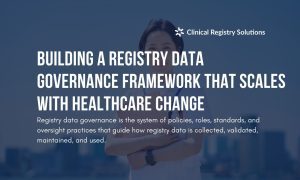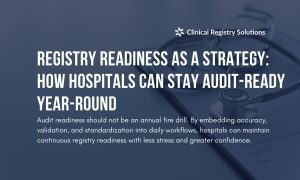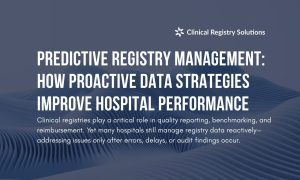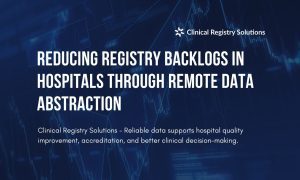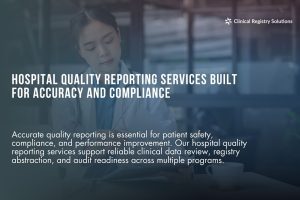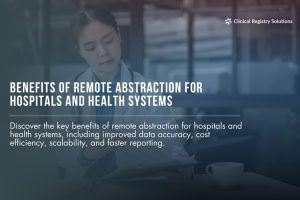- Overview: The ACC NCDR CathPCI Registry is a vital database for tracking PCI procedures, improving patient outcomes, and supporting hospital benchmarking.
- Importance: Enhances patient care, ensures compliance with standards like CMS and Joint Commission, and drives research in interventional cardiology.
- Key Data Elements: Includes patient demographics, procedural details, and outcomes like mortality and complications.
- Challenges: Data accuracy, manual abstraction workload, and keeping up with updates—solved through outsourcing and automation.
- Optimization Tips: Use analytics, training, automation, and benchmarking to boost performance.
- Future Trends: AI integration for real-time insights, with services like Clinical Registry Solutions leading the way.
- Benefits of Partnering: Expert abstraction, AI tools, and dedicated support for better registry compliance and hospital efficiency.
Understanding the ACC NCDR CathPCI Registry
The American College of Cardiology’s (ACC) NCDR CathPCI Registry is one of the most critical databases for tracking and improving percutaneous coronary intervention (PCI) outcomes in hospitals and healthcare systems. It provides benchmarking, quality improvement, and data-driven decision-making for interventional cardiology programs.
For hospitals, health systems, and data abstraction services like Clinical Registry Solutions, understanding how to optimize registry participation can significantly impact patient care and hospital performance.
What Is the CathPCI Registry?
The CathPCI Registry is part of the National Cardiovascular Data Registry (NCDR) and collects clinical, procedural, and outcome data from PCI procedures performed across the U.S.
Why Does the CathPCI Registry Matter?
✅ Enhances Patient Care – Helps hospitals improve treatment protocols and patient safety ✅ Supports Accreditation & Compliance – Assists with meeting CMS and Joint Commission quality standards ✅ Improves Benchmarking – Allows hospitals to compare their performance with national standards ✅ Enables Research & Innovation – Provides insights into PCI trends, complications, and success rates
Key Data Elements in the CathPCI Registry
The CathPCI Registry tracks essential metrics, including:
📌 Patient Demographics & Medical History – Comorbidities, prior interventions, and risk factors 📌 Procedural Data – Stent placement, contrast volume, and fluoroscopy time 📌 Complications & Outcomes – Mortality rates, vascular complications, and revascularization outcomes
These data points provide real-world insights that hospitals and abstraction services like Clinical Registry Solutions can use to improve clinical decision-making.
Challenges in CathPCI Data Abstraction & How to Overcome Them
Data abstraction for the CathPCI Registry can be complex, requiring precise clinical documentation and compliance with evolving guidelines. Common challenges include:
- Data Accuracy & Consistency 🔹 Challenge: Variability in clinical documentation can lead to inconsistent reporting.
- Time-Intensive Manual Abstraction 🔹 Challenge: Traditional data abstraction is labor-intensive and prone to burnout. 🔹 Solution: Leveraging outsourced abstraction services like Clinical Registry Solutions or Quality Health Data can reduce workloads and improve efficiency.
- Keeping Up with ACC NCDR Updates 🔹 Challenge: The ACC frequently updates registry guidelines, requiring continuous education. 🔹 Solution: Partnering with CathPCI-focused abstraction experts ensures compliance with the latest standards.
How to Optimize Your Hospital’s CathPCI Registry Performance
- Implement Advanced Data Analytics Using custom-built solutions from Clinical Registry Solutions can provide real-time performance monitoring and predictive insights.
- Train Data Abstractors Regularly Ongoing education is crucial to maintaining high-quality registry submissions. Partnering with expert abstraction companies ensures data is accurate and up to date.
- Automate Data Abstraction AI and automation can reduce manual workload and improve data accuracy. Hospitals using outsourcing to Clinical Registry Solutions see improved registry compliance and reporting efficiency.
- Use Benchmarking Reports Effectively Hospitals that actively review and act on CathPCI benchmarking data can: ✔ Improve door-to-balloon times ✔ Reduce bleeding complications ✔ Optimize stent selection and procedural strategies
Conclusion: Partner with Clinical Registry Solutions for Best-in-Class Data Abstraction
If your hospital is looking to optimize its CathPCI Registry performance, reduce abstraction workload, and improve data accuracy, consider Clinical Registry Solutions.
🔹 Expert abstraction services tailored to CathPCI requirements 🔹 AI-driven solutions to enhance registry compliance 🔹 Dedicated support for hospitals and cardiology programs
📞 Contact us today to streamline your CathPCI Registry abstraction and take your hospital’s performance to the next level!
🚀 Visit www.clinicalregistrysolutions.com to learn more.
FAQ
What is the ACC NCDR CathPCI Registry?
The CathPCI Registry is a national database under the American College of Cardiology’s National Cardiovascular Data Registry (NCDR) that collects data on percutaneous coronary interventions (PCI) to improve quality, outcomes, and research in cardiology.
Why should hospitals participate in the CathPCI Registry?
Participation helps enhance patient care, meet accreditation standards, benchmark performance against national data, and support innovative research in PCI procedures.
What are the main challenges in CathPCI data abstraction?
Common issues include ensuring data accuracy, managing time-intensive manual processes, and staying updated with ACC guidelines. Outsourcing to experts like Clinical Registry Solutions can address these effectively.
How can AI improve CathPCI Registry management?
AI tools automate data abstraction, provide real-time analytics, reduce errors, and offer predictive insights, making registry participation more efficient and impactful.
How do I get started with Clinical Registry Solutions for CathPCI support?
Visit www.clinicalregistrysolutions.com or contact their team to discuss tailored abstraction services, AI solutions, and how they can optimize your hospital’s registry performance.
